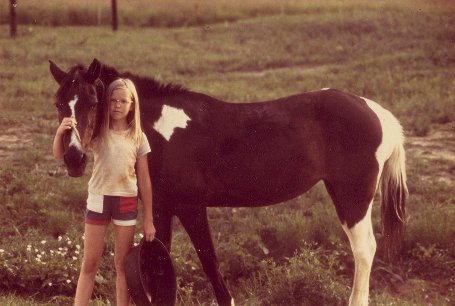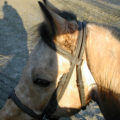Actually, my first love was dinosaurs: at age eight, I knew everything about them. I had a set of dinosaur cards which I could put in chronological order, and I knew that a tyrannosaurus could never have eaten a dimetrodon – they lived millions of years apart, in completely different eras.
I don’t remember exactly when or why horses took over in my imagination; perhaps it started with the books. In fourth grade, we moved to the larger campus of the International School of Bangkok, with a much bigger library. I devoured every book I could find about horses, especially those by Marguerite Henry (Amazon UK | US), with beautiful, full-color illustrations by Wesley Dennis (they don’t print them like that anymore). I bought the few horse books available in Bankok’s paltry English-language bookshop; these were classic English girls-and-ponies stories, recounting a life that seemed very exotic: imagine being able to live at a school where you could also keep your very own pony!
I had very little experience of real horses. When we took family trips to Pattaya Beach, my big treat was a half-hour ride, led by the bridle by the horse hire man. I was always frustrated: I wanted him to let go, so the pony and I could gallop on the sand, just like the scenes in my favorite book, Henry’s “King of the Wind.” There was a polo club in or near Bangkok, where we went once a year for the big American Fourth of July bash. It was possible to take riding lessons there, but my parents never offered; I don’t know why.
I rode in my imagination, and I drew horses, practicing constantly, looking at Wesley Dennis’ pictures for reference. If I couldn’t be near horses, I wished I could at least draw them properly. I felt a thrill of pride the day I finally produced something that really looked like a horse.
The summer my dad and I returned to the US, we visited my aunt Rosie and cousin Casey in the Texan countryside where, to my great delight, I got to ride a few times. When we settled in Pittsburgh, I begged to take lessons, but that was more than my dad could afford as a grad student. I kept riding in my dreams, now with Walter Farley in the Black Stallion books. My mother sent from Thailand a Chinese brush-style painting of two black-and-white horses, which had pride of place in my room among my posters and pictures – mostly of horses.
I spent the summer of 1972 with Rosie and Casey again. Casey had her own horse then, a big palomino called Flash, and there was a small horse for me, a docile old pinto mare called Dolly. We rode, though not as much as I would have liked (Casey was a teenager by then, and had other concerns). We often rode bareback, since it seemed cruel to put heavy western saddles on the horses in the Texas heat. We’d canter across the fields, poor old Dolly laboring gallantly to keep up with Flash. At the end of each ride, we’d steer them into the “tank,” an artificial pond full of muddy water, so they could cool off and drink. On the last day of my visit, we were mounting up for a farewell ride when Flash reared, startled by a puppy that suddenly shot out from under the barn. Casey fell and, landing awkwardly, broke her arm.
The following summer I attended a girl scout camp in Pennsylvania whose activities included riding. I was delighted to do everything with “my” own horse: cleaning, tacking up, feeding, and of course riding. It was a glorious two weeks, except for the time a camp counselor tried to make me drink tomato juice.
I don’t remember getting anywhere near horses while we lived in Connecticut. Then we moved to Bangladesh, and eventually I went to Woodstock School in India. It’s possible to hire horses in Mussoorie, but our allowance as students didn’t stretch that far, and these ponies were such sad, skinny little things that I felt more pity than desire to ride them.
I spent my freshman college year at the University of California, Santa Cruz. Alongside formal classes, the university offered short, informal courses, including riding (off campus). So I began to learn English riding, and again took care of my own horse. He was huge, with hooves the size of dinner plates; I affectionately called him “Moose.”
From my sophomore year of college, I transferred to the University of Texas in Austin. Here, again, I looked for opportunities to ride, finally finding a cheap place out of town where you could hire a horse and ride around in barren fields among the mesquite bushes (not a place you’d want to fall off). I was on my way there one day when I ran a red light and wrecked my grandmother’s old car, which put an end to both driving and riding for some time (I wasn’t hurt in the accident, but had no other way to get out there).
Horses vanished from my life after that, except in artwork and in dreams. The last two embroidery projects I did, during pregnancy and early motherhood, were a pair of carousel horses, for my friends Stephanie and Robin. But the Chinese painting still hangs in my home, and, whenever I doodle on paper, horses flow out of my pen. I rarely got to see horses in Milan, but sometimes we’d run across them elsewhere, and I’d stop to gaze.
It’s all Ilaria’s fault that Rossella got the bug. Ilaria had been Ross’ classmate since preschool. When they were eight years old, she began riding at a stable in Milan, and one day took Ross along to try it out. I was travelling, so didn’t get to see Ross’ historic first lesson, but I heard all about it by phone – it took only the one lesson for Ross to fall in love.
I could afford lessons for her, and had a flexible enough schedule that I could accompany her to them two or three times a week. I made good use of the time: while Ross was riding ponies, I took lessons on horses. She progressed faster than I did, partly because I was travelling a lot for work and had to rebuild muscle after each absence. But I finally became comfortable cantering and jumping, and even got a bit cocky. They say you’re not really riding until you start falling off; I was really riding! Ross and I used to keep score; we were neck-and-neck (in number of falls) for about the first year.
I finally got scared the time I fell on my head. It wasn’t the horse’s fault; I lost my balance after a jump, and just tipped off over his shoulder. I remember the trip down, looking at the horse’s hooves and wondering if I was going to fall under them. I don’t remember the impact, nor anything else for 15-20 minutes after that. I was never unconscious, but there’s a blank in my memory: the next thing I knew, I found myself in the clubhouse, talking to someone, having no idea how I got there, though apparently I had done so under my own steam.
I went to the hospital for x-rays, but there was no damage (I had been wearing a proper riding cap, of course), just a fierce headache. But the joy went out of it for me; I was scared of jumping, but bored of trotting around in the manege, and in Milan there’s no place to ride outdoors. So eventually I gave it up, and these days I’m just an observer.
Rossella continued to ride, and to fall, and to love horses madly. She would volunteer to clean the school ponies, which students were not required to do (their groom loved her). We’d spend hours in the stables, just being with horses, which made us both happy.
The riding school in Milan is very competition-oriented, so the usual progression is from the basics and “pony games” competitions on school ponies, to sharing a pony or buying your own, and moving on to higher competitions. Ross began show jumping on a shared pony in 1999, and in 2000 we began looking for one to buy.
The buying project was delayed by our abortive move to California, but when I returned to Milan definitively in 2001, it was time to look again. Ross had attended riding camp at Wellington Riding in England three summers in a row, so we enlisted their aid in finding a pony for her in England (even with travel costs etc., this is cheaper than buying a pony in Italy, where few ponies are bred). We made a special trip up there in September, 2001, and found Hamish. He finally arrived in Milan in November.
…and this is getting long, so I will gush about Hamish some other time!






